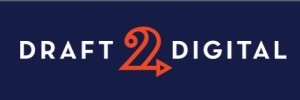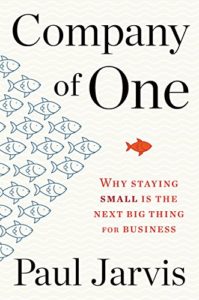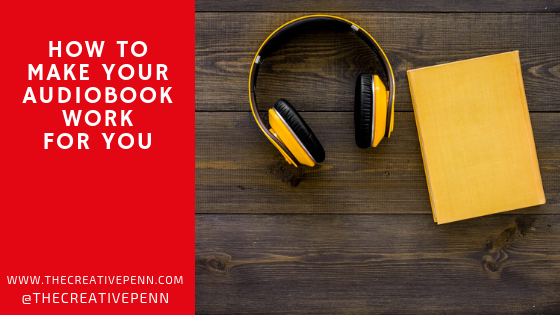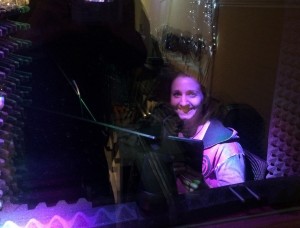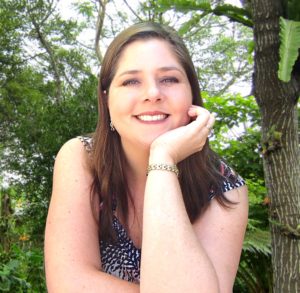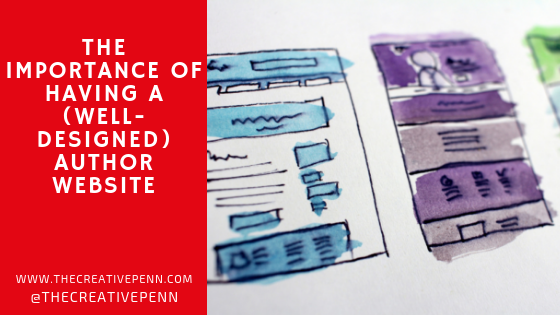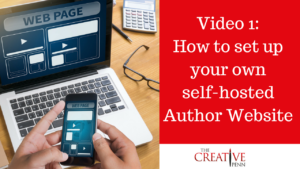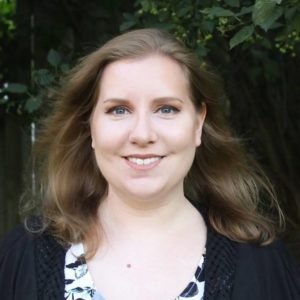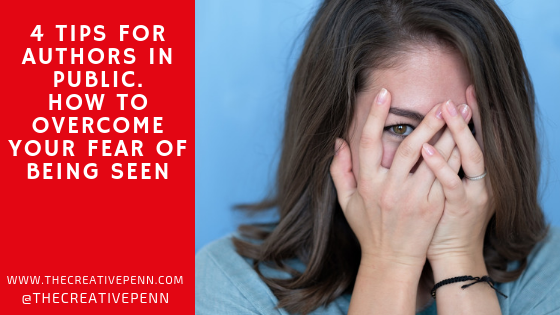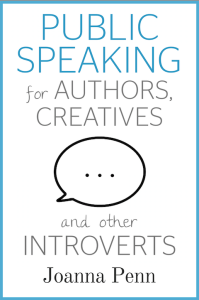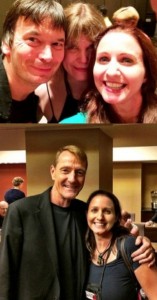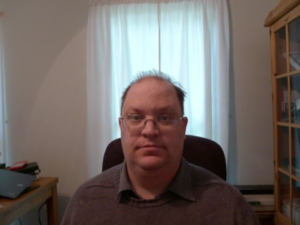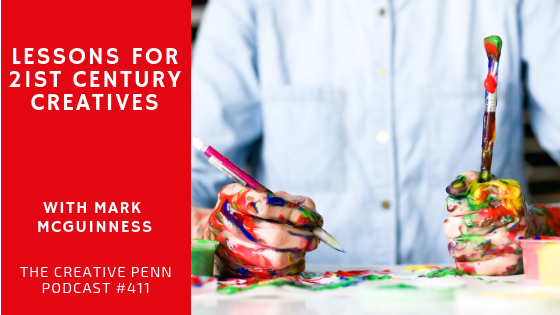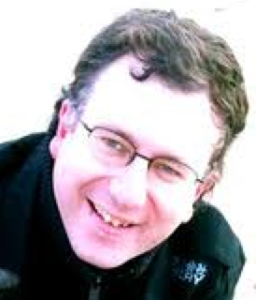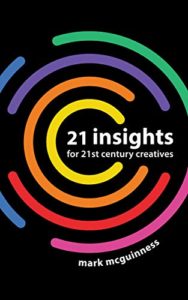How To Be A Successful Company Of One With Paul Jarvis
What if you could scale your revenue without growing your expenses? What if you could make a living with your writing but still remain alone in your writing room? I discuss these questions and more today with Paul Jarvis.
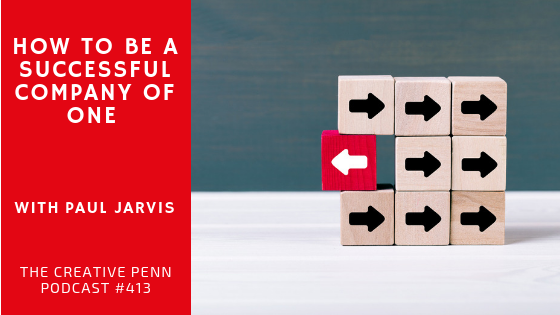 In the intro, I talk about second-hand book sales [Dean Wesley Smith], how the death of poet Mary Oliver can help deepen our writing [listen to her on the On Being Podcast], why ‘sparking joy‘ is so important (referencing Marie Kondo on Netflix), plus the Kickstarter for Intellectual Property Tracking.
In the intro, I talk about second-hand book sales [Dean Wesley Smith], how the death of poet Mary Oliver can help deepen our writing [listen to her on the On Being Podcast], why ‘sparking joy‘ is so important (referencing Marie Kondo on Netflix), plus the Kickstarter for Intellectual Property Tracking.
Today’s show is sponsored by Draft2Digital, where you can get free ebook formatting, free distribution to multiple stores, and a host of other benefits. Get your free Author Marketing Guide at www.draft2digital.com/penn
 Paul Jarvis is a writer, a designer, a podcaster, an online course teacher, and software creator. His latest book is Company of One: Why Staying Small is the Next Big Thing for Business.
Paul Jarvis is a writer, a designer, a podcaster, an online course teacher, and software creator. His latest book is Company of One: Why Staying Small is the Next Big Thing for Business.
You can listen above or on iTunes or your favorite podcast app or watch the video here, read the notes and links below. Here are the highlights and full transcript below.
- The difference between a company and a solo author
- Why growth isn’t the by-product of success
- On feeding the hungry ghosts
- The importance of paying attention to the audience we already have
- Tips for introverts who are building an email list
- The importance of hiring support when you can afford it
- Setting boundaries to support who you are as an author
- Tips for being resilient in the face of rapid change
- Why smaller companies have an advantage over larger ones, especially when it comes to changing direction
You can find Paul Jarvis at pjrvs.com and on Twitter @pjrvs
Transcript of Interview with Paul Jarvis
Joanna: Hi, everyone. I’m Joanna Penn from TheCreativePenn.com, and today I’m here with Paul Jarvis. Hi, Paul.
Paul: Hey, how are you?
Joanna: I’m good. Thanks for joining me. Just a little introduction.
Paul is a writer, a designer, a podcaster, an online course teacher, and software creator. His latest book is ‘Company of One: Why Staying Small is the Next Big Thing for Business‘.
As soon as I heard about this, you started talking about it on your newsletter a while ago, and I was like I need to have you one the show because Company of One is such a great title.
Before we get into the book, tell us a bit more about you and how you got into writing.
Paul: A few years ago, my mom sent me a package, and in the package was a bunch of books. I’d forgotten I had written them, a bunch of books that I’d written in grade school. And they were pretty long as well. They were all illustrated.
It was about a hamster that was also a Top Gun pilot.
Joanna: Cool.
Paul: I’ve always enjoyed writing. I forgot that I did, in my early adult life. And as an adult, I’d always wanted to write. I just kept telling myself this silly story, like, ‘You aren’t a writer.’
And then I realized one day, wait a second, if I just started writing, then I would be a writer. And then that voice in my head saying I’m not a writer, that would not be true anymore.
So, I started writing articles, and I’ve kind of always blogged on and off, but for probably about six, seven years ago now, I wanted to see if writing could be a viable job or something I do for work.
At the time, I was a web designer, and I figured, okay, I’ll separate out the income that I make for web design and then the income that I could make on writing, and if the writing income ends up making more than web design, then maybe I’ll switch from being a web designer to a writer.
It’s funny, the first book that I wrote cost me zero dollars, because at the time…I like to do these weird experiments, and my wife just kind of plays along, where I didn’t want to buy anything for an entire year. The first book that I wrote was a cookbook.
All of our plates and cutlery…I wanted to have photos in the books, most recipe books have photos, all of our plates are kind of ugly. We don’t have fancy things. So, I basically figured out a way to do the book for zero dollars.
A friend of my mine was a pastry chef at a five-star restaurant, so I borrowed lots of stuff from their kitchen. My friend who is an editor needed some web work, so I traded her editing for web design. The photographer, I was like, ‘Hey, you can eat all of the things you photograph, do you want to help out?’ So, she said, ‘Sure.’
So, I produced the book for zero dollars, and I spent literally nothing on the book, and I released it. And then as it started to make money, I had money to spend a bit more on the next book. And then as that book made money, I had a bit more to spend on the next book.
I really kept things separate because I wanted to really make a go of, ‘Hey, if I want to do writing, let’s see if I can do this as a viable source of income.’ So that’s kind of how it started, with trying to spend zero dollars on anything.
Joanna: Which is awesome, and we’re going to come back to questions about scaling revenue without expenses, because I think that’s really interesting.
But I wanted to come straight back to the title, because a Company of One, and many writers listening, they might be writing fiction or nonfiction, but they feel like they’re a writer or an author, and they’re one, but they don’t necessarily feel like they’re a company.
What, in your mind, differentiates a company from someone just writing a book and trying to make a little bit of cash.
Paul: Companies need revenue, and I think there’s different levels of being a company. You can have a part-time company. You can have a business on the side where you’re maybe writing evenings and weekends, and you’re making enough for extra money to put into savings to go on vacation or that sort of thing.
But I think if you’re looking to make a company, like a full-time company, then it needs to make enough revenue to support all aspects of your life. Just like your day job should support your rent or your mortgage and food and car payments or whatever it is that you spend money on.
I think that’s probably the definition, is it needs to be profitable in some way.
And I think there also needs to be some kind of longevity because, especially with writers, you can write a book that does well, it’s hard to write a lot of books that do well. But I think that’s really the goal is to have a continued career doing this as opposed to just one book.
I think it’s hard to write your first book, but I think it’s harder to write your second book, at least for me. I think I’m on book five. It doesn’t really get easier.
And to define what a company of one is, I guess really just any business that questions growth. So, it can be a one-person business. It can be a 50-person business.
The whole thesis of the book is that growth isn’t the by-product of success. Choice is a by-product of success, or freedom to choose is a by-product of success.
So, in that way, you can be a one-person business and do well and decide, ‘Hey, I don’t want to grow.’ Or you can be a one-person business and do really well and say, ‘Hey, I want to grow, say, a small team or an even bigger team.’
But it’s just a matter of deciding what makes sense, because growth doesn’t always make sense. It just sometimes makes sense.
For me, I have a small team that I work with, especially for writing, because I’m not good at all aspects of writing. I have a bunch of people that I work with to really make my writing better, to be honest.
Joanna: I always preach on this show hiring an editor, hiring a book cover designer, hiring web help for people who aren’t very technical, that you have to hire out those things.
You can do freelancing and work for hire. You don’t have to have employees, which is kind of what you’re talking about.
But it’s interesting, because the ‘enough’ number is really interesting. I want to talk about that because authors are pretty obsessed with book sales. And before we started recording, you said how many podcasts you’re doing. Your publisher clearly wants you to sell some books, right? You don’t just put the book out there and happy days, it’s out.
So, you have a number of things. You talk about the ‘enough’ number, the beast, the hungry ghost, and also ego.
I wonder if you could talk about how these things relate to the author life and book sales.
Paul: Yeah, so to the first point, enough, I think that when we start any business, whether it’s writing or anything, we start kind of at zero. Like, you don’t say, ‘Oh, I want to be an author,’ and you have 10,000 people or more lined up to buy copies of your book.
That sounds great. I would love if that happened. I don’t actually think that that ever happens. In the beginning, we all start in this pre-enough phase.
We’re all working towards, we’re all growing towards having enough to support ourselves in the career that we have in writing. And so, we have to adopt this kind of growth mindset where we need to sell enough books, or we need to generate enough revenue.
Where I think things can go awry is when we don’t question whether or not we’ve hit enough. Because in startups, same as in writing, we just think that, ‘Oh, we need to sell more, more, more, more, more.’
And at some point, it could be that we have enough books sales, or we have enough of an audience that can support us, and we can make decisions to optimize for enough as opposed to optimizing always for growth.
It’s just like with writers, ‘Oh well, maybe I could sell more if I water down my writing or I made it more palatable to more people.’
When in reality, it could be more along the lines of, ‘I just want to write books that relate to the audience that I have, however big or however small.’
If I’m selling enough books to make a decent living, then maybe that’s all I want. Maybe I don’t want to be noticed at the yoga studio or out for groceries. Like, that, to me, wouldn’t be a life that I want. I would rather be known to a small group of people who support my enough, as opposed to recognized when I’m out or having to do, like, talk shows and travel all the time.
That, to me, isn’t success. I like the life that I have. So, I think that’s kind of enough.
The hungry ghost kind of applies to that. It’s a bit of a Buddhist story about how there’s this hungry ghost that’s never full. And I think that really relates to enough, because a lot of times, we just want more and more and more, and we don’t think about why. And that’s kind of the hungry ghost story, where appetite is never completely full.
And a lot of that relates to ego. And I think ego is a good thing, because we need to have enough ego to say, ‘I want to write something that matters. I want to write something and share it with other people.’ That’s the good side of ego.
All writers should have that where they want to share something, because I think everybody has a great story in them to share, whether it’s writing or anything.
Where I think ego can lead us astray is when we just want more without questioning why. So, if we just want more book sales and we don’t even know why we want them, or we want to be on, say, ‘The New York Times’ bestseller list, and we don’t even know what that means or how that works.
I think it all kind of relates to a little bit of introspection around what we need versus what we want and why we want the things that we think we want, because maybe we don’t.
Joanna: I think so much of this comes from almost a myth in the publishing industry, that I think is not even really true now, which is you have to hype, hype, hype, do the launch, hit the list, and you can retire, and you’ve made a million.
I like the fact that you’re looking at more of a longer-term approach, which is what I talk about. Many authors listening will feel like they are not making enough right now, and that’s completely fine if people are feeling that.
But one of the things I really like that you were talking about is scaling up revenue without expenses. And this is something that’s really prevalent right now in the author community because the rite of paid advertising, in particular, is the expenses can grow and can outstrip your revenue quite quickly with things like online ads.
What are some ways that authors could scale up revenue without their expenses growing too much?
Paul: I think just questioning what it is that you need. Do you need a brand-new Apple laptop when the one you’ve got works? I replace my computers probably once every seven years, if that. Same with my phone. Phones are so expensive now.
Joanna: Battery life is so bad, though, after about two and a half years.
Paul: Yeah, exactly. But it’s $2,000 for a tiny pocket computer. I think it’s ridiculous.
Looking at all of the expenses that we have and seeing what we need, what we don’t need. I don’t need an office to write. This is my house. I’m sitting in my house right now in a spare bedroom that I share with my pet. And it’s more his room than mine.
I don’t need the expense of an office. I don’t need business cards, because I live in the woods on an island. I don’t actually see people where I could give a business card to. I haven’t had business cards in probably 15 years.
The other thing to think about is if you grow your revenue, how much is it going to cost to grow your revenue? Because I think a lot of people get obsessed with the gross number, whereas we should be paying attention to the net number.
I don’t care how much money I bring in for gross revenue. I care what my profit is after my expenses are taken out of the equation. I would rather spend less but make the same amount, and then I have more profit, versus spending more to make more.
And it doesn’t always work out. I’ve never done any paid advertising because I don’t think that it’s necessarily worth it for the things that I do. Remember, I’m focused on a smaller audience that gets me, that doesn’t need paid ads. Like, they find me through other means.
And things like email marketing is perfect for me because I can write a newsletter. I like writing, so I write an article once a week. I’ve done that for six years. Actually, six years, two days…I started my newsletter six years ago on, I think, November 10th or so.
I’ve been writing this newsletter for over six years now. And it’s called the ‘Sunday Dispatches,’ so I release an article obviously every Sunday. And that, to me, has been the best way to both connect with my existing audience, which I think a lot of authors don’t think about.
They’re always looking at getting new people to read their books as opposed to making sure that the people who are already paying attention are happy, and are satisfied, and like the work, and like the new work.
If we stop paying attention to the audience we already have, and they’re the ones who are already paying attention to us, then I think things can easily go awry. I like to think about all of the ways that I can continue to reach my existing audience. And they actually tell a lot of people.
I feel like they’re my unpaid sales force. As long as I keep them happy and engaged, and I listen to what they have to say, and I write things that they want to read, they go out and share that. They go out and share the things that I make and the things that I write, and it reaches more people that way than I could myself, even through paid advertisements.
Joanna: I think I heard about you on ‘Being Boss,’ podcast. And then I signed up for your email list that way. So, I’m interested, because I would assume you’re an introvert.
Paul: Very much, yeah.
Joanna: You live on an island, never go anywhere. And so, it’s interesting because a lot of people listening, a lot of authors are also introverts. I’m an introvert. I do travel more than you do.
But what are some of the ways, then, that people have found you? Because email marketing only works when people actually get on your email list.
What are some of the ways that you’re getting people on that email list, in an introvert fashion?
Paul: Having a consistent cadence. I’ve never missed a Sunday other than when I’m taking a break. I don’t send emails during the holidays, like, from about American Black Friday to the new year. People are too busy then. I feel like nobody misses me then, because everybody’s getting too many emails then anyways.
But otherwise, I have such a cadence with that list that people expect it. And then I try to make sure that the writing that I write is both interesting and valuable, because then I feel like people are going to share that, and people do share that.
And the thing I like about email is that people reply all the time, which is nice because I feel like I have a direct connection with my audience and I can see what resonates with them and what doesn’t.
So, if I see one article, I got like 500 replies and it was shared tons of times, versus another article where I got 10 replies and it wasn’t really shared, then I can see, ‘Okay, my audience is really interested in this topic, but not this topic.’
Maybe I can write more about that or more in that style or around that idea. And then it fosters sharing.
And then, in the beginning, when I hadn’t reached enough with my writing, I was doing writing for different publications and just trying to get word out, trying to do interviews, like the ‘Being Boss’ show. I was just trying to figure out, ‘Okay, these are the type of people that I want to reach. These are the type of people that would be in my audience if they knew about me. So where are they hanging out now?’
And I’ll go to them. I’ll try to meet them where they are already spending time, and then when they hear about me on those places or they read my words on those places, then they’re going to come to my website.
And all my website focuses on, there’s no popups, there’s no distractions, there’s no anything. The biggest thing is the signup. Every single page has the newsletter signup. I know my newsletter drives the majority of my revenue and is responsible for the bulk of my book sales. So, I focus a lot on that.
And my whole website, my website doesn’t even really focus on selling anything because I know that people probably aren’t going to buy right away. But if they’re on my list and they read an article a week from me, if I keep showing up on their radar, if I keep showing up in their inbox, then they’re gonna buy something, eventually.
It’s usually a couple months, but it doesn’t matter to me when they buy. If they’re interested and they buy, then that’s all that matters.
Joanna: I think email marketing is really good for, like you say, a company of one, because you can scale yourself through email marketing.
What are some of the other systems that are important for scaling? For example, the very first person I ever hired in my extended team was a bookkeeper because it was like, this is something I’m not good at.
I do not want to reconcile my bank accounts and all of this by myself. So that, to me, was kind of scaling, because I got a freelancer.
What are some of the systems that you have, and what have you found successful in that way?
Paul: I definitely have an accountant and bookkeeper. I tell people I’m good at making money. I’m not good at keeping track of that money. I think having an accountant and a bookkeeper should save you money because, it’s funny, because when you don’t run a business, you think, ‘Well, I owe the government, like, a fixed amount based on my income.’ And it’s never that way.
A good accountant is going to find ways that you pay the government less, which is…I like that. I’m very cheap. I like paying the government less of my hard-earned money.
Joanna: And then you could give some to charity if you like, to those people listening here were like, ‘Ah.’
Paul: Exactly. I do actually do a lot of animal-related charity stuff. If I’m spending less on giving the government money, then I can put more into what I care about, which is animal welfare stuff.
The other thing is I have a lawyer, and I think that that’s really important as well because if you’re running a business, your business needs to, one, be set up properly, and two, you need to be the least liable as possible should anybody want to take issue with you.
Even for things like reviewing contracts, I think that that’s really important. That, to me, is a huge thing.
And, I mean, for me, I always look to figure out ways to be able to do more without having to spend a lot more and without having to manage. So, for me, I know I’m really good at doing work. I’m not very good at managing people. I’m actually awful at managing people.
Even things like making dinner, I do most of the cooking in the house. And if my wife is like, ‘Oh, how can I help with dinner,’ I’m like, ‘I don’t know.’ I’m very bad at giving people tasks, so in my business, I only hire people that don’t require any management.
I hire people who are really good at what they do. They may cost a little more, but I don’t need to manage them. So, for example, my copy editor, we communicate in emojis.
Joanna: That’s a great copy editing tip.
Paul: That’s so weird. We have a shared Google Drive folder, so when I write an article, it goes there. He gets a notification. He sends me a ‘thumbs up’ that he’s received it and then a ‘pencil’ when the article is finished being copy-edited.
I send him a ‘thumbs up’ when I’ve gone through the revision, so he can have one final pass. I don’t need to ask him if he’s doing his job. I don’t need to tell him, ‘Hey, you need to do this work.’ He just does it, and I don’t need to manage him.
Same with my podcast editors, same with my developmental editor, same with my accountant, my lawyer. All of the people that I work with, the small team I have, one, they’re all freelancers so I don’t have to worry about HR or…I don’t know how any of that works.
Joanna: Payroll books.
Paul: Exactly. I don’t want to be responsible for any person other than myself. I know that they work on other things, and I’m happy that they do, because if I don’t have work for them, I don’t need to pay them.
And then, two, I pay them more than typical because they’re really good at what they do, and they don’t require management. So, I can have as much time as possible to do the work I like, and I don’t have to spend time managing them or having meetings.
I don’t like any of that stuff. I would rather just pay them a premium for the A players. They do their job well without interference from me. And so that, to me, works so well.
Joanna: I have a really wonderful virtual assistant, Alexandra. Hi, Alexandra. And we literally, we’ve been working together nearly five years, and we’ve spoken twice or three times, really.
And it’s so funny because again, this might be the company of one, introvert, author thing, I don’t know. But it’s quite common in our space to be like that, and it just works super well. So, I really like that.
So, what you are good at, I really noticed, is saying, ‘No,’ because I think you also took a break on your email when you were writing the book.
Paul: I did.
Joanna: And said, ‘Right. Bye, bye. I’ll be back later.’ I don’t know how long the break was, but can you talk about saying no? Because I feel like it’s very hard to say no. Many of us struggle with this.
How do you manage your time and not offend people without feeling guilty?
Paul: The first thing is I went from being a child to being a curmudgeonly old man, so that helps.
Joanna: How am I going to do that?
Paul: I went straight from 9 to 73.
A lot of people have said, ‘Well, it’s okay for you to have boundaries, because you’re where you’re at.’ And I’d correct them, and I’m like, ‘I’ve always had boundaries, and I think that’s why I’m where I’m at.’
For me, boundaries are important, because if you don’t set them with other people, they’re going to set them for you. And you may not like where that boundary ends up.
When I was doing work with clients, I would always say, ‘I’m completely available between this hour and this hour of the day. If you call or email after those hours, I’ll get back to you the following day.’
So, I wouldn’t get calls at 3:00 in the morning or emails that needed a response at 11:00, and I go to bed really early. I wouldn’t get emails at 11:00 and expect a response, because I set that very clear boundary.
Even with writing, in the contract, it said that I would do a three-week book tour. I don’t want to do a book tour. I don’t like speaking. I also feel like I’m not a big enough deal.
I couldn’t go to any one city and sit there and have a crowd of people. It would be me with…and this is just a story in my mind. It would be myself with a stack of books and a cardboard cutout of myself, and I’d just be sitting there twiddling a pen.
I didn’t feel like that was a good use of my time. So, I challenged it. I was like, ‘I don’t want to sign this contract if I have to do a book tour.’
And my agent was like, ‘Well, are you sure you want to go to bat for this? They may not want to work with you.’ I’m like, ‘If they don’t want to work with me for something that silly, then we’ll find another publisher.’ Like, ‘It doesn’t matter.’
In the end, the publisher didn’t care. They’re like, ‘Okay, that was just boilerplate anyway. We’ll take it out.’
Joanna: Just before you go on, that is so true, and people just assume this stuff. But again, as an introvert, you’re going to do much better doing a whole load of stuff like podcasts and writing and you’d reach far more people than doing a physical book store. It’s just a signing. It’s crazy that they still include that in a boilerplate.
Paul: There’s a lot of crazy things about the publishing industry, but that’s another conversation. But I think that the point there is that a lot of times, we feel like what we want to say no to or where we want to set our boundaries is scary, because we think it’s going to be a big deal to the other side.
It typically isn’t.
And then the other thing for setting boundaries that makes it less scary is if you make it a general rule as opposed to something personal. So, what I mean by that is, somebody will invite me to do a speaking gig at a conference, and when I reply, I’ll say, ‘I don’t do speaking gigs. I’ve never done them. I’m not interested in doing them.’ Which is a lot better than saying, ‘I don’t want to do your speaking gig.’
It’s just a rule. It’s a general rule I have. It’s not personal to you, it’s just this is just not what I do. I always try to think of when I say no to things or when I set boundaries about things, I think about how I can make it a rule, because then it’s not specific to that person, it’s just a general rule.
People don’t have problems with rules. In society, we pretty much follow rules fairly well. So, the more that we can set our boundaries around rules, the easier it becomes to enforce those rules, because then it’s just, ‘This is a rule. You can’t argue the rule.’
Joanna: I like that a lot. I’ve been, as we talk now, I’ve just done what is my last speaking gig on my calendar that I had booked a long time ago, and now I want to set that rule, but I’m also quite scared of setting that rule.
It’s a challenging thing to set boundaries, especially if you’re trying to move your boundaries from where they were. Ten years ago when I started out, I needed to speak to make some income. So again, quite different.
I want to also ask about mindset issues, because mindset is something that is so…I feel like goes up and down. And especially, we’re in an environment of fear in the media right now, and people feel like companies might be struggling and growth is super important because of that reason.
What are some of the mindset issues that company of ones face, and how do we get over that?
Paul: A lot of nonfiction writers really try to be like, ‘This is the blueprint. My book is the blueprint. My thesis is the blueprint that everybody should follow.’
I’m not really like that. I feel like Company of One, the book, is more just a way for people to better think about the questions that they might have around building their business. And so, the book really just brings up questions, right?
Things like ‘Why do you want more? Why do you really want more?’ Because a lot of times, we’ll tell ourselves a BS answer. And then we have to get past those stories we tell ourselves.
We spoke about we also need to think about how much is enough, and how will we know when we’ve reached enough? And then, what will change in the way that we work or in the way that we do things once we’ve reached enough? We talked about this as well, but does this growth serve just my ego, and is that a good or a bad thing?
The other thing is how does growth serve or help our existing audience? Because maybe it doesn’t. Maybe our audience likes the fact that we’re fairly accessible.
I’m a pretty accessible person. If somebody replies to my newsletter, I’m going to reply back if they ask a question.
Whereas if my newsletter was a million people and I got thousands of replies instead of hundreds of replies, maybe I couldn’t do that. So, I don’t even want a bigger audience at this point. I like that I can have that interaction with my audience, because I feel like it helps me just as much as it may help my audience.
The other thing is to think about what the maintenance costs of saying yes to things are, because maybe saying yes to a certain opportunity could mean, ‘Oh. Well, you need to hire three more people.’
Do you wanna manage three more people? For me, the answer is always pretty much a resounding no. The other things to think about are things like how does…and we spoke about this as well, like, how does this growth affect my profit, my net profit? And then how does it affect my happiness? Would I be happier?
And I think a lot of times, we need to work backwards into the life that we want thinking about what it daily entails, because if I had a bigger company, my day would be filled with managing that company.
I like doing work. I really like writing. I really like making things on the internet. If I had a bigger company, I would have to manage the people doing the work that I want to do. I would be promoting myself out of the job I want, which doesn’t make sense.
Those are some of the kinda specific things that we can think about to challenge the prevailing mindset that growth is always good and always beneficial, because I don’t necessarily think that it is.
Joanna: Coming back then on ego, and there are a lot of mindset issues in the independent author community around social standing when there’s traditionally-published authors at a conference and independent authors at a conference.
Some days I think the stigma of self-publishing has gone away. And other days, I’m like, ‘Whoa, what’s happening?’
You’ve done both indie and traditional.
What do you think are some of the ego things around the different types of publishing, and how has that impacted your choices in any way?
Paul: I think a lot of it is the grass is always greener. When I was independently publishing books, I felt like, ‘Oh, if I was traditionally published, I would have all of this help and it would make me seem like a more legitimate author.’
And now that I have a traditional publishing deal, I’m like, ‘There’s a lot of good things about independent publishing, like being able to pick my cover.’ I feel like I’m doing the same amount of work to promote the book when I was on my own versus having a publisher.
I don’t feel like there’s much change. I think we all just want what we can’t have or what we don’t have.
Doing traditional publishing, for me, was just an experiment. I just wanted to see what traditional publishing was like. I actually like independent publishing and self-publishing a lot. I didn’t even know if my next book will be traditionally published.
The grass is always greener. I think if somebody was going to be that, like, turn their nose at somebody who’s independently published, I wouldn’t want to talk to that person anyway, at a conference.
Why would I wanna talk to somebody that’s just going to be that much of a dope about things? I think there’s benefits on either side. And I think a lot of it is work you have to do on your own, whether you have a publisher or not.
I feel like I’m doing the same amount of work. I feel like the biggest benefit to traditional publishing was I got to work with the editor that I really, really wanted to work with, and he works at a major publishing house. So that was my option.
Joanna: It is kind of tied into your overarching theme, which is looking at the questions around what you really want. And if you really want to work with that editor, then yes, that’s where you go. And the pros and cons on the other side are whatever.
We’re almost out of time, but one of the things you talk about is resilience and ability to adapt in the face of change, which is one of the things I love about being independent. We can move so fast.
I can just jump on a thing, whereas, bigger companies take a longer time to move. And you do mention AI and the end of jobs. And I’ve just been listening to ‘AI Superpowers,’ which is a new book that’s just come out, and really thinking about how this is going to work.
What can make a company of one resilient in a future where we’re looking at such fast-paced change?
Paul: I’ve been working for myself for two decades now, and I want to keep working for myself for probably another two decades.
Dean Becker, who’s the CEO of Adaptive Learning Systems, he’s studied resilience since, I think, 1997, and he found that resilience above education, training, experience, like, that’s what leads to success in any business.
There’s three traits that he found that all resilient people have. The first is accepting reality, because we can’t control everything. And I think this is especially important to authors, because we think, ‘Oh, well, I want to be on the bestseller list or hit number one on Amazon.’ And I think that’s a good thing to shoot for, but there’s no guarantee to get there. It doesn’t matter who you are.
The New York Times specifically, does editorialize that list, so they pick who they want on the list, even the list that are based entirely on numbers, which is a bit more meritocratic. But still, like, you don’t know what book is coming out that week.
If J.K. Rowling has a book out that week, you’re not going to sell more books than her. So, I think a lot of times, we just have to accept reality.
And what would that even do for us? And sometimes, it’s nothing. How can we instead get the book out in places we can control, like to our own audience who are probably waiting to read the book and are probably really happy that the book is coming out.
So, accepting reality is first trait.
Second trait is having a sense of purpose. And I think that’s super important for authors, because if you’re writing just to make a lot of money or to rank on lists, that’s fine. But you can’t control that, so it’s probably not going to last very long.
If you’re writing because you feel like you have a point of view that needs to be shared or you have a story that other people need to hear, then ranking on those lists or selling this number versus this number doesn’t really matter.
If you have a sense of purpose, it’s going to keep you going long-term. Having a sense of purpose that’s related to vapid or ephemeral things, it’s really hard to keep that going long-term.
Third thing is the ability to adapt. And I think this is really where companies of one or smaller businesses have a leg up on bigger businesses, because things are always changing. Even the way that self-publishing works, almost every month, it changes. When I first started publishing, there was no KDP program.
There wasn’t CreateSpace and Kindle Direct, so it was a lot harder to sell independent books. Now independent books show up in the exact same places and in the exact same way that traditionally-published books show up. They’re not sorted on Amazon. It’s just, ‘This is the book.’
Being able to adapt and being able to change, just like you said, when you’re one person or when you’re a smaller team, it’s easy to adapt and pivot. If you’re a big company, it takes a lot to move.
I can imagine how hard it would be for a company like Google to change directions entirely on what they do. They have tens of thousands of employees. It wouldn’t even happen, they’re so big.
Whereas you or I can just be like, maybe I want to write about something different. I moved from writing vegan cookbooks, to writing a book about creativity, to writing a book about online business, to where I’m at now. I can pivot whenever I want based on what my audience needs and based on what I wanna focus on.
Those three things, accepting reality, having a sense of purpose, and having the ability to adapt or pivot quickly can really help us when we’re just a smaller organizational unit to be able to make things work long-term.
I don’t want to be a writer of one book. I want to be a writer of lots of books. I want to keep going. And I think those are the things that will help me be able to keep going in the long term.
Joanna: I agree with you because if it’s not AI, it’s whatever else it is, or it’s difficulties with Amazon. There’s always a new technical challenge, but it’s the overarching concepts, I think, are really important.
I highly recommend Company of One. I really enjoyed it, and as I said, as soon as I heard the title, I wanted to buy it. I think it’s brilliant. I hope everyone listening goes and gets that.
Where can people find you and everything you do online?
Paul: So, ofone.co is the book’s website. And there’s a bunch of pre-order bonuses there.
Pjrvs.com is my website, so that’s where the newsletter that we were talking about, the ‘Sunday Dispatches’ lives. So, if you Google Paul Jarvis, I come up on the first couple pages, so I’m pretty easy to find, even though my URL is not easy to remember.
Joanna: It’s one of those really old ones, isn’t it, where you set something up and then thought about it later.
Paul: Exactly. I registered that so long ago, and it was more just to prove a point, like the URL doesn’t matter. So, I picked a really hard-to-remember one, and then it just kinda stuck.
Joanna: And hard to say out loud.
Paul: Exactly. And then it just kinda stuck. And now, I’m stuck with it.
Joanna: There’s another little tip right at the end of our show, pick something you can say out loud on a podcast.
Paul: Exactly. Like, ofone.co is way easier than pjrvs.
Joanna: Either way, thank you so much for your time, Paul. That was great.
Paul: Yeah, thank you very much.
Podcast: Play in new window | Download

